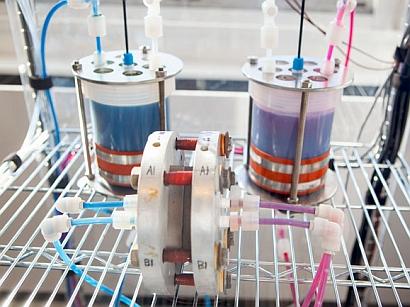Cheap, Efficient Organic Flow Battery Materials From Harvard
Posted by Big Gav in energy storage, flow battery
Ecogeek reports that a group from Harvard have developed an organic ("rhubarb based) flow battery that could help hasten to transition to renewable energy - Cheap, Efficient Organic Flow Battery Materials.
The science of power storage has a new variety of options and new materials to investigate thanks to some recent developments in the chemistry of materials used in flow batteries. Until now, flow batteries have largely relied on metallic compounds for the active chemicals they use. But new materials have been found that are cheaper and more effective than the chemicals which have been most used in flow batteries until now.The research undertaken by scientists at Harvard University has identified a range of organic compounds known as quinones, which are have the potential to be especially useful for flow batteries. Initial research indicates they are inexpensive and efficient materials well suited for use in power storage. A recently published paper in the journal Nature discusses the use of 9,10-anthraquinone-2,7-disulphonic acid (AQDS), a compound found in rhubarb, in a flow battery.
Large-scale energy storage is an area where flow batteries can excel, because the equipment needed to build a large energy storage system is basic, industrial gear, rather than highly specialized equipment. To increase storage capacity, a flow battery just needs a couple of larger storage tanks.
The AQDS materials are naturally abundant and very stable. They are potentially safer than metal-based flow batteries because the materials are "less likely to react violently if they accidentally come in contact with each other." When used in a flow battery, they show very good cycle efficiency and "[represent] a new and promising direction for realizing massive electrical energy storage at greatly reduced cost." The chemicals needed to store a kilowatt-hour of energy would cost $27, which is roughly one-third the cost of other systems.






